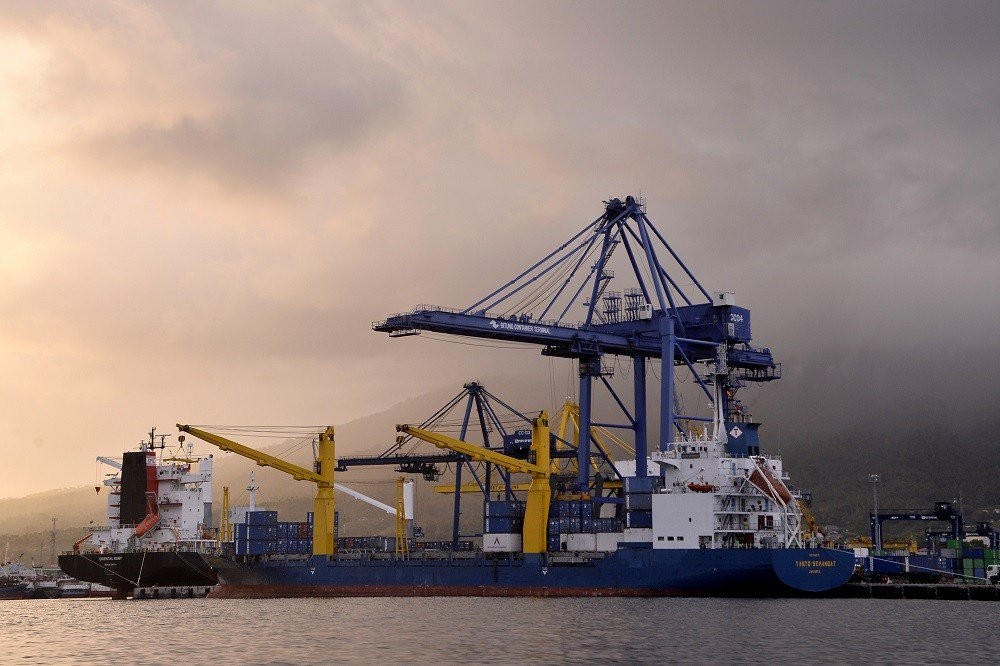Popular Reads
Top Results
Can't find what you're looking for?
View all search resultsPopular Reads
Top Results
Can't find what you're looking for?
View all search resultsLand issues, government and civil society
In the annual review of the Agrarian Reform Consortium, secretary-general Dewi Kartika displayed some interesting infographics.
Change text size
Gift Premium Articles
to Anyone
 A ship discharges cargo at Bitung Cargo Port in North Sulawesi in October 2016. The government wants to turn the port into an international hub seaport, part of its infrastructure development efforts, which rating agency Moody's Investors Service lauds in its latest Indonesia's rating outlook revision. (Antara/Adwit B. Pramono)
A ship discharges cargo at Bitung Cargo Port in North Sulawesi in October 2016. The government wants to turn the port into an international hub seaport, part of its infrastructure development efforts, which rating agency Moody's Investors Service lauds in its latest Indonesia's rating outlook revision. (Antara/Adwit B. Pramono)
I
n the annual review of the Agrarian Reform Consortium, secretary-general Dewi Kartika displayed some interesting infographics. Presenting the government, the business sector and civil society organizations (CSO) as three circles, it was evident that over time, the business sector grew in size and edged closer to the government, while the CSOs shrunk in size and grew more isolated.
This is discouraging because the nature of government-to-business cooperation is more pragmatic than countervailing. There is nothing wrong with government-to-business cooperation. In fact, it is a positive thing — if it were held at arm’s length.
For instance, the development of infrastructure would be very difficult if there was no understanding that the government’s commitment to the public good is in line with the commitment of private businesses to shareholders’ wealth. Government-to-business cooperation strengthens growth for all enterprises, if public interests and values complete the picture to promote balanced and sustainable growth.
Turning to land use, we remember that in the colonial days, plantations were the main users of land. Their employment opportunities also absorbed a large part of the rural poor. When independence came, plantations were not liberalized but grew more entrenched in to the national economy. Although associated with colonial times, tropical plantations growing industrial crops such as rubber, sugar and oil palm are once again expanding, with palm oil leading the export economy.
The oil palm plantation industry employs hundreds of thousands of workers, with minimal effort to empower the rural community. Sensing the continuation of colonial practices, labor activists are campaigning against the reemergence of forced labor and inhuman state capitalism.
Tanya Murray published an online article called “The price of un/freedom: Indonesia’s colonial and contemporary plantation labor regimes” on the issue. Recognizing that both “free” and unfree labor regimes have had a long history in Indonesia, and plantations have pivoted between these modes more than once, Murray’s study compares plantation labor regimes in the colonial, New Order and Reform periods (post-1998) to answer three questions.
First, given that employers always want to access disciplined labor at the lowest possible price, what were the conditions that led employers to rely on unfree labor in some cases, and “free” labor in others?
Second, to what extent was unfreedom imposed as a response to excessive freedom among workers and peasants?
Third, how were the costs of social reproduction distributed between workers and employers, and what pressures from workers or regulators (state, colonial, transnational) affected this distribution?
Murray drew on ethnographic research in West Kalimantan (2010–2015) to explore contemporary experiences of un/freedom among workers on state and private oil palm plantations. These are the underlying practices that escaped Indonesia’s vocally expressed desire for independence and a better society. They are so ingrained that many accepted the practices in a massive display of Stockholm syndrome.
Generations of Indonesians accept the economic chasms separating the disenfranchised from the elites as an entrenched reality. However, a small determined civil society constantly brought the issue to the fore and invited the public to be aware of glaring cases of injustice including criminalization.
Although politics rarely brought results, occasionally they brought hope, especially when regime changes were anticipated from Sukarno to Soeharto and from Soeharto to the current kaleidoscope.
Actually, in the years leading to 2018, Indonesia had made strides in agrarian reform. Rina Chandran of Thomson Reuters reported in September 2018 that government officials touted a new agrarian reform law as a major step forward in an ambitious land distribution program. But activists immediately warned that the plan would fail without legally recognizing the territorial rights of indigenous people.
The government distributed more than 5 million land titles in the last year, said Moeldoko, the presidential chief of staff. The government aimed to issue 7 million titles in 2017 and 9 million in 2018.
President Joko “Jokowi” Widodo highlights the issuance of certificates in media events. But Dewi Kartika points out that without necessary reform, this only legalizes land ownership. To be sure, many welcome the government’s efforts to fight poverty through land distribution, but success largely depends on genuine reform, importantly passing the long-pending draft legislation on indigenous titles.
Rukka Sombolinggi, secretary-general of the indigenous people group AMAN, says that “they should immediately pass the indigenous peoples’ bill, which recognizes the customary and collective rights of indigenous people over land and resources”.
The public dialogue is lively because there is a dedicated civil society. They keep the government honest and provide balance to public policies. They also provide insights and information to business people.
Serious business seeks to put social goals ahead of special interests. Working with an informed government and a socially responsible culture, civil society can function as a necessary countervailing force to bring reform to reality.
***
The writer, a former presidential spokesman (1999-2001), is the founder of InterMatrix Communications, which advises the indigenous people group AMAN. The views expressed are his own.










